It is in the bus to the Freedom Square that Tbilisi first gives us its glimpse. If you’ve never heard of it, Tbilisi is the capital of Georgia. Its mazelike, cobblestoned old town reflects a long, complicated history, with periods under Persian and Russian rule. Its diverse architecture encompasses Eastern Orthodox churches, art nouveau buildings with ornate balconies and Soviet Modernist structures. Looming over it all are Narikala Fortress, a reconstructed 4th-century citadel, and Kartlis Deda, an iconic statue of Mother Georgia.
No 37 from the airport, coloured in a tinge of an orange that I have somehow only associated with the Eastern bloc. Last time I saw it, it was on the tram in Budapest. The bus is old, weary and worn off from the trips it has made through the airport and probably through the eras, a Soviet one, a post-Soviet one and a post-war one.
As the lady conductor, clad in green, helps first timers around with the ticketing, an old bald man watches us enter the bus with an expressionless face and then dozes off. As a morning Sun glints through the man’s head, our bus is off on its rickety journey to Tbilisi.
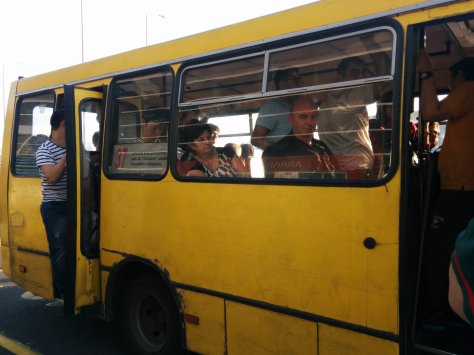
The outskirts of Tbilisi resemble a countryside from a 60s movie. Old manufacturing plants, ramshackle garages, abandoned(or so it seemed) buildings, rusted sedans. The bus stops at regular intervals, a few people boarding at each of them. On one such stop, fat woman clad in black enters. Within moments, there’s garrulous chatter in bus and all of a sudden it seems that everyone who got in already knew everyone inside.
Closer to proper Tbilisi, the first signs of a ‘city’ are visible – towards the right, a huge winged complex, perhaps an upcoming shopping mall, then old multi-story buildings, one apartment lined after another, like a stack of matchboxes, their balconies adorned with drying underwear and bicycles and toys and all other things sundry that define the notion of a city life for a local as much as they defy it for a tourist.
As we stop outside one such building, the fat lady gets out and at least two more aboard to stand in the space vacated by her. The bus moves on. A few hills are in sight, and perched over them, the signs of an ancient city, orthodox churches with conical tops, houses donning hats of terracotta roofs, further ahead on a hill, in the far distance, the tall statue of a lady with a bowl of wine in one hand and a sword in another, Mother of Georgia, they call her, who welcomes friends with the wine while at the same time warding off enemies with the sword.
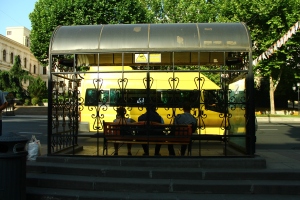
The bus then turns and veers deeper into the streets of Tbilisi, awarding a closer look at the very same houses. They’re different – old, in colours of grey, blue, black and brown, worn out. In some of them, patches of peeling off plaster reveal brick stacks of a different era, somewhere else, the balconies hang precariously as if they’d fall off any moment and in some others, the paint has given way revealing a not-so-ancient call for attention to itself.
The doors and windows of the houses are a story in themselves. Large and sturdy, at places wooden, at places metallic, all with carvings on them, somehow inviting us into a world that could run decades back. If Georgia were a time travel story, its doors and windows would certainly be the time machines.
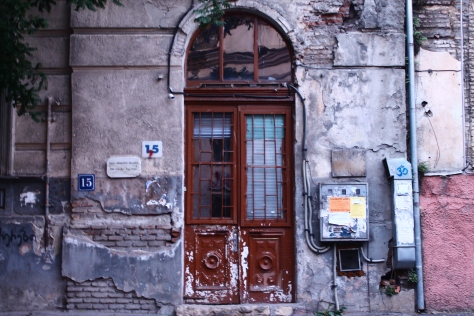
We get down at Freedom Square, called ‘Lenin Sqaure’ in Soviet era, which is a completely different facade of the Tbilisi that we just crossed on our way. The square glitters in the pride of a millennia old land celebrating a more recent independence.
Off to the Rustaveli avenue from there, named in the honour of Georgia’s 12th century national poet, Shota Rustaveli. His poem ‘Knight in the Panther’s Skin’ (or Vepkhistqaosani, leave a comment if you can pronounce that!) is a national epic, describing a story of friendship and love that transcends Arabia & India.
On the avenue, old, stout ladies with as much a preponderance of wrinkles on their faces as the lack of them on their stark orange uniforms, clean the footpath alongside the street and stare at us foreigners roaming aimlessly at this hour in the morning. Further ahead we peep through the closed glass doors of the Georgia National History museum that exhibits the legends of this country from pre-historic times. (Just so you know, Georgia has a history of wine cultivation dating back some 8000 years!)
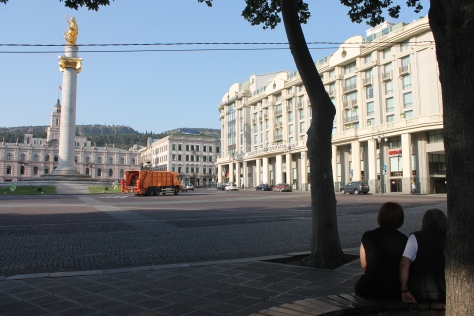
Meanwhile, our curiosity (and hunger) pushes us to explore the darkest of alleys even in morning. Most of them lead to closed residential compounds with a common center-court, something reminiscent of the chawls of Mumbai and similar residential buildings in Budapest. In one such alley, members of a famous Russian heavy metal band, Aria, stare back at us from half torn posters of their upcoming concert in Tbilisi while jostling for space with mindless scribbling on the walls of the alley.
We follow the scribbling and the signs of a ‘possible’ eatery inside, only to find two pot-bellied men, one of them topless, standing in the courtyard of the building and staring at us. A little intimidated, we swiftly rush out and find a basement cafe to try our luck at some breakfast. There, a certainly sloshed lady at the counter first nods a yes to our queries for a breakfast, then no and then exasperatedly falls into the arms of the man sitting beside here, equally, if not more, sloshed. (Some party it must have been last night.)
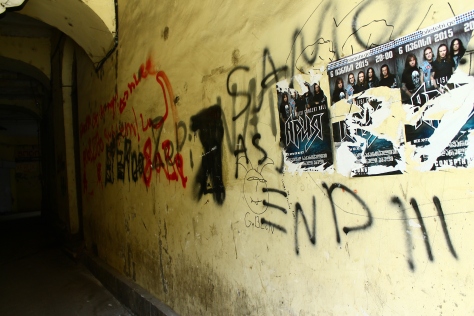
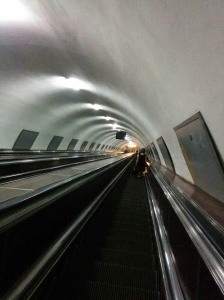
Eventually, we do find a simple breakfast of puff and coffee in one of the cobblestoned backlanes and while the city is still only waking up, make our way to Didube, the main bus station. The journey begins at the Rustaveli metro station where the vertigo inducing escalators run deep and deeper into the ground, and into the history of this city, as it happens in most East European cities. The first metro line between Didube & Rustaveli, was built in 1966.
And even though, almost seventy years apart from Buapest’s UNESCO heritage status metro line, this one has no less a charm of its own. The old train grumbles as it runs through the dark tunnels & shrieks as it stops while young college kids in the train kiss each other on the cheeks to bid hellos and goodbyes. Tbilisi is both ancient and young at the same time.
At Didube station, a cute little well-dressed kiddo is amused by the chocolate in my hands. I possessively hide it while my friend lets go of the wafers in hers for the kid. Having cleared ourselves of our guilt, we make our way out.
The subway from station to the bus stand is a revelation in itself, of old hags clad in black from top to bottom asking for money, of the numerous hawkers who all want a pie of your wallet, however small it be; those who sell candles for a silent moment with the Lord, those who sing with a guitar and a hat, for a few laris for the beer in the night perhaps.
At the bus station, men sit behind stacks of coffee beans pitching the best ones to their customers, grannies sit on footpaths selling fresh berries and apricots, ladies stand behind huge kegs selling drinks I can never figure out the name for, in spite of asking several times and in all this, they jostle for space and volume levels with taxis and their drivers, Marshrutkas (buses), shops and hoardings. I walk up to an old lady selling a big range of fresh fruits.
I take a picture of hers, though I know it is the lady beside her who is more eager. She prompts me and poses (above shot). I focus on her eyes, and something about them hits me. Probably it’s the eagerness in them or their simplicity, so similar to that of the young kid who came asking for our wafers & chocolate earlier. Somewhere in the deepest of its emotions, Tbilisi blends its old and its young, the ancient and the new, even though it’s a place, to put it in the words of an old Floyd song, ‘lost in thought, and lost in time‘.
Meanwhile, our taxi driver’s calls grow louder in the distance and we make a run past all those stalls in the station, for the taxi, while a sleepy Tbilisi from the night before, is just coming back to life.









